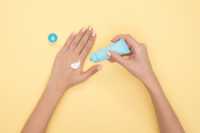MedicalResearch.com Interview with:
Lara B. McKenzie, PhD, MA
Principal Investigator in the Center for Injury Research and Policy
Research Institute at Nationwide Children's Hospital
Associate Professor in the Department of Pediatrics
College of Medicine and the Division of Epidemiology
College of Public Health at The Ohio State University
MedicalResearch.com: What is the background for this study? What are the main findings?
Response: Social media and other online tools have changed the way people seek and share health information. Recent consumer interest in natural, organic, and ethically-made personal care products has led to an increase of shared recipes for homemade products including sunscreen.
The study found that nearly all (95%) pins, or bookmarks, for homemade sunscreen positively portrayed the effectiveness of homemade sunscreens and most (68%) recommended recipes for homemade sunscreens that offered insufficient UV radiation protection. Sun Protection Factor (SPF) claims were made in a third of pins with a range of SPF 2 to SPF 50. This is concerning because the ingredients recommended in homemade sunscreen pins offer minimal scientifically proven broad-spectrum protection from UV radiation yet are widely shared and promoted as safe alternatives to commercial sunscreens on Pinterest.
Homemade sunscreen products are risky because they are not regulated or tested for efficacy like commercial sunscreens. When you make it yourself, you don’t know if it’s safe or effective. With rising skin cancer rates, the use of effective broadband sunscreen is critical to protect the skin from UV radiation and reduce incidence of skin cancer. (more…)

